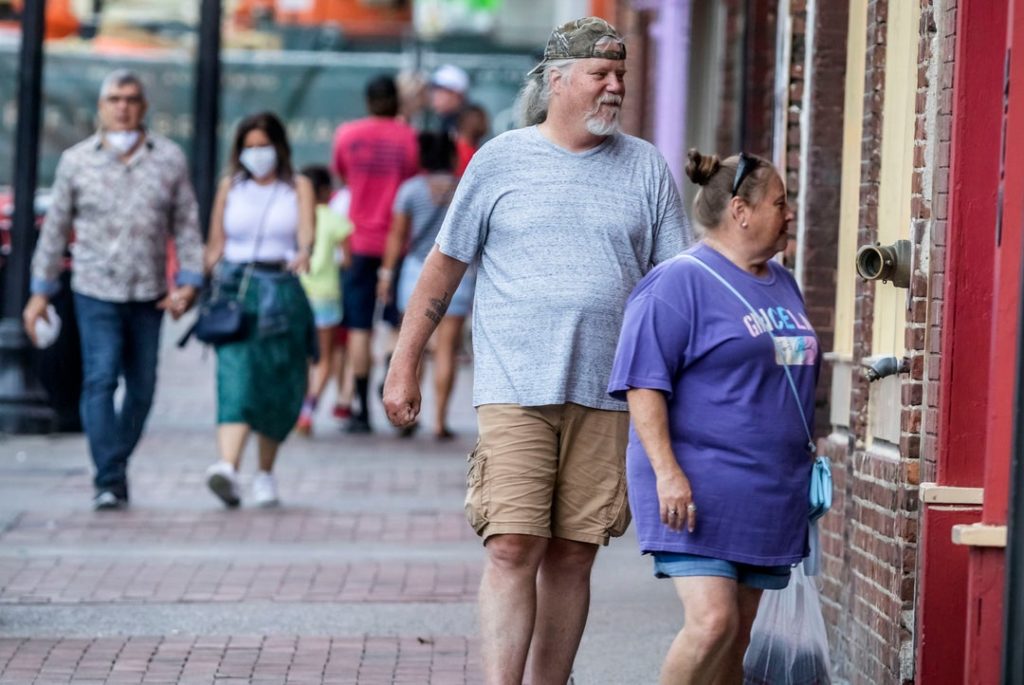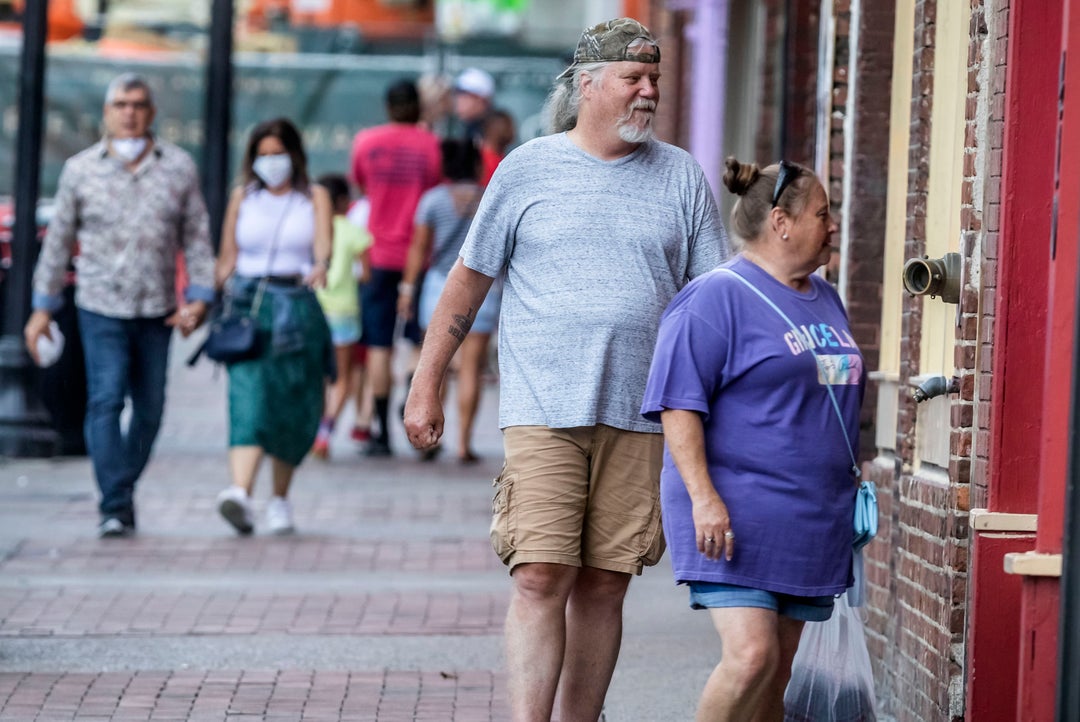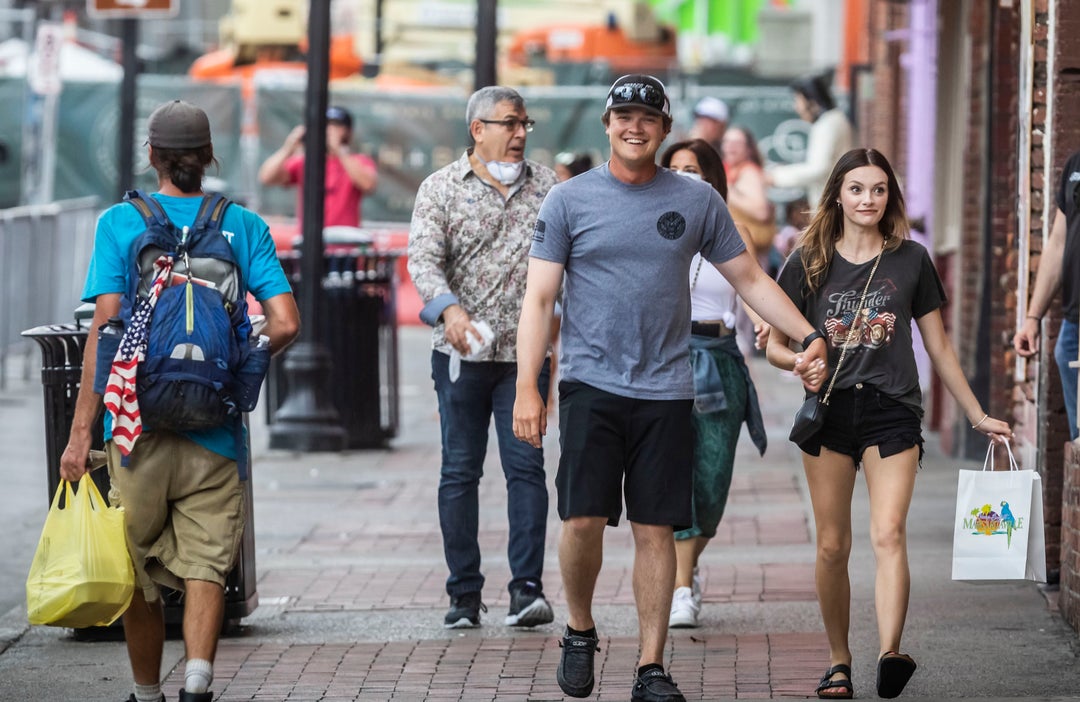Nashville’s mask mandate seen as key to keeping city open – The Tennessean
Nashville’s mask mandate seen as key to keeping city open The Tennessean

Nashville health leaders see a face mask mandate as a bulwark that can keep the city from moving backward in its reopening plan — something they’ve expressed they have little desire to do.
Face masks are required in Nashville starting Monday, with several exemptions. With COVID-19 cases surging in recent weeks, officials hope that with public buy-in, masks could curb the spread of the virus.
On Saturday, the city recorded its highest-ever single day of new infections with 350 new cases. And Tennessee reported the highest-ever count on Friday, with 1,410 of new infections in a single day.
The face mask measure comes as several leaders have accused the city of moving too fast to reopen businesses. Though face coverings are an important tool to help mitigate spread of the respiratory virus, some contend a mandate is just another step in the city avoiding responding appropriately to reopening plans.
“Public officials don’t want to admit they were wrong to reopen the city so quickly,” Council member Colby Sledge posted in a statement on Twitter Monday. “We could have taken a slower route that put the health of our residents first, while safely reopening some businesses and re-injecting some enjoyment into our daily lives.”

Last week, Nashville health officials debated the wisdom of mandating masks, which at least some, including Health Director Dr. Michael Caldwell, saw as unenforceable. But during a board of Health meeting on Friday, faced with the likelihood the virus will continue to spread, officials said the city had come to a crossroads: Embrace mandatory masks or risk the closure of businesses.
“We want to keep moving forward and not go backwards,” the city’s COVID-19 task force chair Dr. Alex Jahangir said. “We don’t want that to happen in Nashville and making mask mandatory will help us prevent that.”
Some states slow down, local officials continue to monitor
The United States grapples with a pandemic that is strengthening in some states and cities, with particularly steep inclines in the South, including Florida, Texas, Georgia and South Carolina — states that reopened sooner than most of the country.
Masks and other face coverings are now viewed as the best defense against the spread of the coronavirus, prompting an increasing number of states and counties to begin mandating masks in public.
Some state governments are walking back or slowing down reopening plans. Despite initially moving forward — even as they’ve reported record numbers of new infections — Florida and Texas reversed course late last week, shutting down bars. Texas also reduced capacity at restaurants.
Gov. Bill Lee and other state officials said they are monitoring the spread of the coronavirus and developing “hot spot plans” for counties where infections were surging. But the governor didn’t provide specifics on if, or when, he would take statewide action.
Locally, Nashville health officials have also said they’ll take appropriate action based on data. But on a call with council members Thursday, Caldwell said there’s been no specific discussion about Metro going back to an earlier phase.
“That’s not something we’ve considered,” he said. “Every day brings new information. I would say that there’s nothing off the table in our proceeding. I think we are trying to balance the reopening with our hospital capacity.”
Criticism of ‘moving goalposts,’ changing plans
The city unveiled its “Roadmap for Reopening” on April 23.
But as the officials moved to phase one, they eschewed what written pandemic plans laid out as the “most important” benchmark, a sustained stabilization or decline of new virus cases. The road map states that a “requirement” for the first phase of reopening is a “sustained downward trend” of new virus cases for 14 days.
But city officials insisted spikes in case didn’t automatically delay reopening of businesses, clarifying they’re looking at a 14-day “rolling average.” A metric dashboard was created on the city’s COVID-19 site, to included other metrics officials said they are monitoring, including transmission rate and testing and hospital capacity.
In press briefings, officials placed emphasis on other metrics such as new daily cases being under 100, and then, the time it took for cases to double.
When Metro progressed to Phase 3 on June 22, officials released an updated road map. The decision to progress in the plan was announced, as three of the six metrics on the city’s dashboard were below Metro’s metric goals. The plan also calls for the city to stay in Phase 3 for at least 28 days before deciding to move forward or backward to a previous phase.

In response, some, including council members, say if the city stuck with its original plan, they would not be moving forward, but reverting or staying in place in the plan.
On a weekly call with the task force, council members said it was too soon to be in phase three and accused officials of moving the goalposts.
“We’ve seen the ramifications of what that’s been,” Sledge told The Tennessean Monday. “Every time we ask as council members as why the metrics are moved, there is always an explanation that they’re getting more information or we are learning all the time.”
“But that learning hasn’t resulted in reduced case,” he said.
Sledge called it “bizarre,” that health officials have focused on when businesses reopens, rather than whether people are safe.
“I don’t want to hear from a public health official when they think we can move to the next phase. I want to hear are people being protected,” said Sledge.
Council member Delishia Porterfield said while she understands the officials are balancing different needs, including people’s financial health during the pandemic, she the city should slow down in reopening, especially as the city still needs to take steps to mitigate outbreaks, particularly in her district in Southeast Nashville.
“Our health and safety need to be the No. 1 priority,” she said. We have to think about
Her advice is what she says she practices herself: Take health matter into your own hands.
“In my house, we are still in phase one,” she said.
Tennessean reporter Brett Kelman contributed to this article.
Yihyun Jeong covers politics in Nashville for USA TODAY NETWORK – TENNESSEE. Reach her at yjeong@tennessean.com and follow her on Twitter @yihyun_jeong.
Published 9:54 PM EDT Jun 29, 2020
